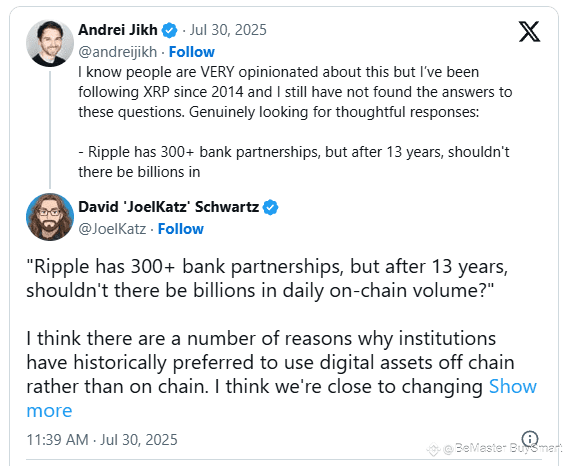XRP’s $XRP Uphill Battle: Low Adoption, Bank Reluctance, and the Rise of Stablecoin Rivals
XRP struggles with low usage despite banks, volatility still a major hurdle
Ripple’s XRP adoption stalls as banks shy away from on-chain transactions
XRP use lags amid volatility, institutional distrust, and stablecoin rise
Ripple faces uphill battle as XRP fails to gain traction with big banks
XRP’s role questioned as stablecoins and private chains dominate finance
Ripple’s blockchain, despite more than a decade of development and over 300 bank partnerships, continues to see low on-chain activity. Concerns from XRP holders recently gained widespread attention on X, forcing Ripple’s co-founder David Schwartz to respond. He addressed key issues including usage volume, token volatility, and the actual role of XRP in global banking.
💥XRP Adoption: Volume and Institutional Reluctance Remain Low
XRP Ledger went live in 2012 with a vision to support cross-border payments among trusted institutions. Despite that, actual XRP transaction volume on-chain remains limited, especially when compared to other major digital assets. While Ripple has maintained consistent banking partnerships, many of these institutions avoid using XRP directly.

Schwartz explained that banks often prefer to settle transactions off-chain due to regulatory and compliance concerns. Because XRP relies on decentralized validators, financial institutions hesitate to resign control to open networks. Ripple has promised new features, like permissioned domains, to mitigate these concerns and enable compliant usage.
Current financial systems still rely heavily on trusted, centralized models. RippleNet’s messaging layer may see usage, but XRP on-chain volume hasn’t reflected that activity. Schwartz acknowledged the slow pace of institutional onboarding, noting that significant on-chain settlement remains a future goal.
💥XRP’s Volatility Raises Questions About Its Utility
XRP continues to face criticism over its price volatility, especially as a supposed bridge asset for stable transfers. While Ripple maintains that short transaction times offset this risk, the broader utility of holding XRP remains uncertain. Critics argue that stablecoins or fiat-pegged assets offer simpler, safer transfer options.
David Schwartz claimed that holding XRP can still be beneficial due to potential upside in pricing and utility as a bridge asset. However, that argument draws comparisons to investment vehicles rather than payment infrastructure. Stablecoins like USDC and tokenized dollars are now widely accepted as efficient cross-border tools.
Stablecoins avoid many jurisdictional risks that XRP currently carries. As governments and enterprises adopt local stablecoin solutions, the need for XRP’s bridging role continues to diminish. The market trend leans toward fiat-based digital assets, weakening XRP’s position in future settlements.
💥Tokenization and Network Trust Hurdles Remain for XRP
Despite Ripple’s efforts in enterprise payment systems, questions persist about the token’s necessity in broader applications like tokenization. Large institutions prefer private blockchain solutions, often bypassing XRP . Schwartz acknowledged this trend but emphasized interoperability as a solution.
Projects like Robinhood use Ethereum-based networks, while others explore building their own chains. These strategies suggest that firms want more control than public chains like XRPL currently offer. While Ripple focuses on partnerships, on-chain activity has yet to reflect meaningful traction.
Foreign governments may also hesitate to use a US-associated token for sensitive financial infrastructure. Ripple operates globally, but XRP’s origins and central management raise concerns for some jurisdictions.
🚀🚀🚀 FOLLOW BE_MASTER BUY_SMART 💰💰💰
Appreciate the work. 😍 Thank You. 👍 FOLLOW BeMaster BuySmart 🚀 TO FIND OUT MORE $$$$$ 🤩 BE MASTER BUY SMART 💰🤩
🚀🚀🚀 NOT JUST LIKE BUT, CLICK FOLLOW BE MASTER BUY SMART - Thank You.
